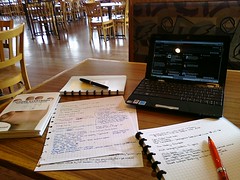 I spend a lot of time reading, some of it related to libraries or work or transiteracy or the digital divide so I’ve been thinking about a way to share it. Then I realized hey! This is a blog by a librarian shouldn’t I be required to post what I’m reading here? This weekend I asked on Twitter and Facebook if there was any interest in what I’m reading. The answer was yes. So here it is!
I spend a lot of time reading, some of it related to libraries or work or transiteracy or the digital divide so I’ve been thinking about a way to share it. Then I realized hey! This is a blog by a librarian shouldn’t I be required to post what I’m reading here? This weekend I asked on Twitter and Facebook if there was any interest in what I’m reading. The answer was yes. So here it is!
Once a month I’m going to write a What I’m Reading post. It will include books, reports, publications, manifestos any other number of official things, it wont include blog posts or articles found online, I already share those via Twitter and this blog.
Books:
I Live in the Future & Here’s How It Works: Why Your World, Work, and Brain Are Being Creatively Disrupted
It wasn’t about print versus digital; it was about immediacy, details, links, interactive graphics, videos, and, most important, hyperpersonalization.
Paper is still gadget number one for reading content; it’s disposable, relatively inexpensive, and relatively simple to create in small or large quantities, and it doesn’t need batteries or a power outlet.
Ask For It: How Women Can Use Negotiation to Get What They Really Want
Keep in mind that what you really want may not be about more—more responsibility, more money, more status. Changing your life for the better isn’t always about being on the fast track or moving higher up the corporate ladder, sometimes it’s about slowing down or moving sideways. So forget about the typical pathways to success in your profession. Take a fresh look at every aspect of your life and figure out what suits you. Consider hiring a personal coach to help you zero in on what would make you happier or help you strike the right balance among your many interests, goals, and commitments.
I wish I could hirer a personal life coach, but mostly I’m thinking that being successful at something doesn’t mean I have to keep doing it. I can say ok, did that, and move on to something new.
WHAT WILL YOU REGRET? Researchers have found that people experience two different kinds of regret: regret about things they’ve done and regret about the things they didn’t do. Overwhelmingly, people regret the things they didn’t do far more. When asked to identify the biggest regret in their life, people are two to three times more likely to describe something they didn’t do instead of something they did.
Don’t think I need to elaborate on this one.
Reports:
There’s an App for That! Libraries and Mobile Technology: An Introduction to Public Policy Considerations (pdf) from the Office for Information Technology Policy
As the information revolution continues to unfold, libraries will experiment with mobile devices and services to support the information needs of their users wherever they may be. The adoption of mobile technology alters the traditional relationships between libraries and their users and introduces novel challenges to reader privacy. At the same time, the proliferation of mobile devices and services raises issues of access to information in the digital age, including content ownership and licensing, digital rights management, and accessibility. This policy brief explores some of these issues, and is intended to stimulate further community discussion and policy analysis.
Universal Broadband: Targeting Investments to Deliver Broadband Services to All Americans (pdf) A project of the Aspen Institute Communications and Society Program and the John S. and James L. Knight Foundation.
Eighty percent of the households with incomes of less than $20,000 subscribe to premium television services whose monthly fees are comparable to, and often exceed, the cost of broadband. This might surprise some who view broadband as more essential than premium television, but it should come as no surprise for a variety of reasons.
First, while television brings value to the individual, broadband’s value depends to a significant degree on how many people in one’s social circle are also using it and how they are using it. Second, there is a large gap between the tools necessary to find and locate trustworthy, substantive content; how to safely interact online; and how to protect personal information. Moreover, using the Internet requires its users to be literate. Fourteen percent of the adult population in the United States, or 30 million people, read at below basic literacy levels, while another 63 million read at just the basic level. Literacy levels do not interfere with television usage, but without sufficient content geared towards those with lower reading levels, the utility of the Internet for those Americans drops dramatically. In short, there is no digital literacy without basic literacy.
Lighter Fare
Recently added to my To-Read List
- What Technology Wants
found via Stephen’s Lighthouse
- No Excuses
found via the Eloquent Woman
Similar Posts:
- Read This! What I’m Reading in December 2010
- My 2013 Summer Reading Books List
- April Reads: Enchantment, Switch and A Game of Thrones. What Are You Reading?

 found via
found via  found via the
found via the 

















